Living with and beyond cancer: The improvement story so far - NHS ...
Living with and beyond cancer: The improvement story so far - NHS ...
Living with and beyond cancer: The improvement story so far - NHS ...
Create successful ePaper yourself
Turn your PDF publications into a flip-book with our unique Google optimized e-Paper software.
6 | <strong>Living</strong> <strong>with</strong> <strong>and</strong> <strong>beyond</strong> <strong>cancer</strong>: <strong>The</strong> <strong>improvement</strong> <strong>story</strong> <strong>so</strong> <strong>far</strong><br />
<strong>NHS</strong> Birmingham East <strong>and</strong> North Health Economy<br />
<strong>The</strong> impact of a community Macmillan<br />
nurse in curative care<br />
Summary<br />
Pan Birmingham Cancer Network <strong>and</strong><br />
<strong>NHS</strong> Birmingham East <strong>and</strong> North<br />
(<strong>NHS</strong>BEN) have worked together<br />
throughout the testing process to<br />
develop five projects <strong>with</strong>in the NCSI<br />
programme of work, targeting breast<br />
<strong>cancer</strong> patients <strong>with</strong>in the PCT treated<br />
at Good Hope Hospital. A focus group<br />
was held to test out the ideas that<br />
came from <strong>so</strong>me gap analysis which<br />
gave valuable feedback to each of the<br />
individual services which were involved<br />
<strong>with</strong>in the Cancer Awareness <strong>and</strong><br />
Recovery Enhancement (CARE) project<br />
<strong>and</strong> what became clear was that<br />
further definition of services was<br />
required to prevent overlap of the five<br />
work streams involved in the project.<br />
<strong>The</strong> five projects taken forward were:<br />
• Bridges Care - Testing the use of a<br />
charity organisation offering<br />
individual needs assessment<br />
facilitating a bridge between health,<br />
<strong>so</strong>cial <strong>and</strong> community organisations<br />
• Own Health Care – A partnership<br />
<strong>with</strong> Pfizer Health Solutions, testing a<br />
telecare model to provide support,<br />
assessment, signposting <strong>and</strong> referrals<br />
• Hospital Care - Ensuring<br />
consistency of access to post<br />
treatment services irrespective of<br />
treatment aim<br />
• Specialist Nurse Care – Testing a<br />
primary care based <strong>cancer</strong> nurse case<br />
management model for those<br />
patients <strong>with</strong>in Macmillan level<br />
3 <strong>and</strong> 4<br />
• Self Management Care – testing a<br />
six week post treatment self<br />
management course entitled HOPE<br />
(helping overcome problems<br />
effectively).<br />
Improvement stories about progress in<br />
each of the five projects are available<br />
online.<br />
<strong>The</strong> following <strong>story</strong> focuses on<br />
specialist nurse care, testing the<br />
Macmillan Primary Care Cancer Nurse<br />
(MPCCN) service, a unique service<br />
<strong>with</strong>in <strong>NHS</strong>BEN <strong>and</strong> Macmillan. <strong>The</strong><br />
role steps away from the traditional role<br />
of the community Macmillan nurse in<br />
end of life care. It is an innovative role<br />
which aims to provide complex, expert<br />
assessment to identify <strong>and</strong> address the<br />
problems faced by patients living <strong>with</strong><br />
breast <strong>cancer</strong>. It al<strong>so</strong> helps deal <strong>with</strong> the<br />
complexities <strong>and</strong> adverse effects of<br />
acute oncological treatment whilst<br />
maintaining (where possible) the<br />
patient in the community setting.<br />
What was the problem<br />
Patients <strong>with</strong> breast <strong>cancer</strong> face not<br />
only the dramatic impact of their<br />
<strong>cancer</strong> diagnosis but al<strong>so</strong> prolonged<br />
multiple modalities of treatment which<br />
can have a profound impact on them,<br />
physically, psychologically, sexually,<br />
spiritually <strong>and</strong> financially. If complex<br />
needs of breast <strong>cancer</strong> patients are not<br />
addressed early this can affect how<br />
they cope <strong>with</strong> their breast <strong>cancer</strong><br />
treatment but al<strong>so</strong> how they cope <strong>with</strong><br />
their transition from <strong>cancer</strong> patient to<br />
<strong>cancer</strong> survivor.<br />
What was done<br />
For the purpose of this project the role<br />
of the MPCCN was re-designed to<br />
provide support in primary care for<br />
patients undergoing their <strong>cancer</strong><br />
treatment for breast <strong>cancer</strong>.<br />
In response to the need for clear<br />
definition of services the MPCCN<br />
devised clinical outcomes, measures<br />
<strong>and</strong> a patient evaluation questionnaire.<br />
<strong>The</strong> measures are captured on the<br />
patient administration system (PAS)<br />
database including the number of<br />
contacts <strong>and</strong> interventions <strong>with</strong> each<br />
patient.<br />
<strong>The</strong> MPCCN was integrated into the<br />
breast <strong>cancer</strong> multidisciplinary team at<br />
GHH (MDT) <strong>and</strong> she attends the weekly<br />
meetings.<br />
To raise the profile <strong>and</strong> develop an<br />
underst<strong>and</strong>ing of the role, the MPCCN<br />
presented the service to the breast MDT<br />
<strong>and</strong> oncology nursing team. Patient<br />
information leaflets were al<strong>so</strong> devised<br />
which would be made available to the<br />
breast care team <strong>and</strong> oncology team to<br />
be given to appropriate complex<br />
patients at time of referral. Clinical<br />
letters are sent to individual GPs<br />
following the initial <strong>and</strong> any<br />
subsequent holistic needs assessments<br />
including information on each patients<br />
individual care plan.<br />
What difference has the testing<br />
work made<br />
Since testing began the MPCCN has a<br />
caseload of 35 complex patients who<br />
require Macmillan level 3 <strong>and</strong> 4<br />
intervention. Every patient who is<br />
assessed by the MPCCN is given an<br />
individualised care plan which is<br />
reviewed at each subsequent visit;<br />
<strong>The</strong> MPCCN has prevented 11 accident<br />
<strong>and</strong> emergency admissions <strong>and</strong> over<br />
100 outpatient attendances.



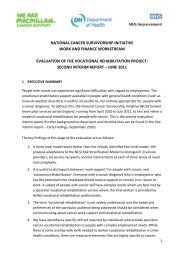
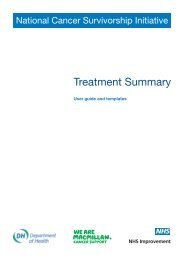
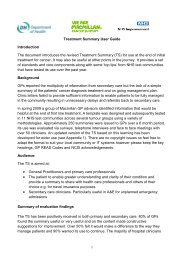
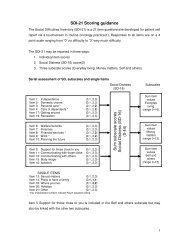

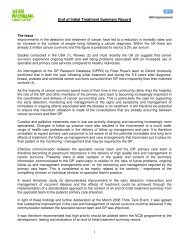
![Download the how to guide [PDF] - Macmillan Cancer Support](https://img.yumpu.com/47067428/1/184x260/download-the-how-to-guide-pdf-macmillan-cancer-support.jpg?quality=85)
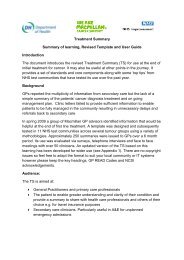

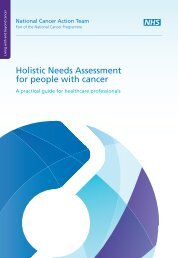



![HOPE Protocol [PDF, 420KB] - National Cancer Survivorship Initiative](https://img.yumpu.com/32566432/1/184x260/hope-protocol-pdf-420kb-national-cancer-survivorship-initiative.jpg?quality=85)